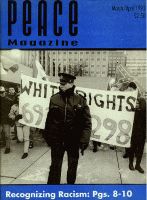
Peace Magazine Mar-Apr 1993, page 13. Some rights reserved.
Search for other articles by Pat Cleto here
In peace or war, women have had to choose between wives or concubines. This choice has faced Third World women since the world became divided for development by First World capital and Third World labor and natural resources. It is one aspect of a larger phenomenon: colonization.
True, women of both "Worlds" are degraded by having to surrender control over their sexuality in exchange for security and property rights. However, in the colonized Philippines, preceding patriarchal structures dovetailed with the colonial structures imposed by invaders. Today the Filipino woman still struggles against her foremost rapist, a militarized society heavily influenced by American culture. American bases have been located in the Philippines since the turn of the century, encouraging American racist attitudes toward Filipino women. Moreover, the Filipino men had already learned to emulate Spanish colonizers who abused women and destroyed the indigenous tribal cultures in which women had inherited political power and functioned as priestesses.
Today, even as Filipino feminist nationalists celebrate the exit of U.S. military bases, they pose other urgent questions, beginning with the issue of prostitution and ending with the future of their society. Women previously survived by serving "Rest and Recreation" areas for America 5 troops. In Angeles City alone, at least 6000 women worked as streetwalkers or in brothels in 1 990. Prostituted women were the second largest group of Filipinos whose income came from the base. They and their abandoned Amerasian children suffered exploitation and abuse from the soldiers. Because of police corruption, rape cases were rarely logged and the women were not assisted when the complaints were against American servicemen.
Filipino women in Toronto's Philippine Solidarity Group heartily welcome news of solidarity being forged now with Asian women through the Asian Women's Council for Human Rights on the issue of prostitution during World War II.
In Manila, Pot Cleto was a founding member of the women's political party Kaibe, and of the Women's Crisis Centre. She is now a member of the Philippine Solidarity Group in Toronto.

Peace Magazine Mar-Apr 1993, page 13. Some rights reserved.
Search for other articles by Pat Cleto here